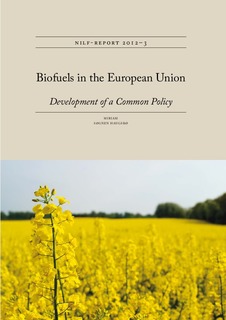| dc.description.abstract | Biofuels are promoted all over the world as alternatives to fossil fuels in the transport sector. Their increasing popularity is due to three beneficial outcomes. First of all biofuels represent a carbon neutral energy source, as these fuels are based on biological material, and hence the emissions from these fuels belong in the natural circulation. Secondly biofuels represent an advantage considering energy security, as through diversifying the energy use, states can become less dependent on the international oil market. Lastly the biofuels for transport represent a possible additional income source for the agricultural sector, since the production of biofuels represents an alternative to traditional agricultural activities.
At the same time however, the production and consumption of biofuels is criticized both related to ecological and social concerns. The ecological considerations relate to the fact that the life cycle analyses of biofuels have revealed that some types do not give the GHG-emission reductions that were initially promised, and to the cultivation model of biofuels, which is based on large plantations, many times lead to the degradation of local ecological conditions of soil, air and water. The social considerations relate to the possible impact on food prices, as biofuels today are produced mainly from food crops, and to the fact that the production of biofuels seldom leads to the proposed rural development benefits, and in some developing countries their production means exploitation of local inhabitants.
The EU is an increasingly important actor at the world biofuels scene, and this report investigates the development of the current EU biofuels policy. The analysis is based on official EU documents regarding biofuels from the beginning of the 1980s up until today, mainly focusing on four different directives. These directives, and relevant accompanying documents, are analysed through a broad institutional approach, applying Peters (2005), Pierson (1996) and Egeberg (2004). A core assumption within an institutional approach is that one should seek knowledge about the institutional framework in order to understand and explain policy outcomes. These theories are also applicable to the EU level, as through time these institutions have become highly institutionalized, and developed from their original scope. The institutional approach also includes the context as an important source of influence to the development of policy. The research question of the study has been: how has the EU biofuels policy developed, and how can these developments be explained using an institutional approach? […] | nb_NO |
